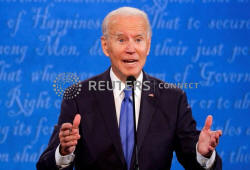Analysis: Biden win would lift Mexico-U.S. ties but energy is 'canary in
the mine'
 Send a link to a friend
Send a link to a friend
 [October 23, 2020] By
Dave Graham [October 23, 2020] By
Dave Graham
MEXICO CITY (Reuters) - A Joe Biden
presidency would lower border tensions and raise pressure on Mexico to
respect U.S. business interests as the two neighbors implement a trade
deal designed to claw back jobs from China, officials and industry
sources say.
Biden on Nov. 3 aims to unseat President Donald Trump, who has stirred
up tensions with Mexico over trade and border security ever since he
referred to Mexican migrants as rapists and drug runners at the outset
of his 2015-16 presidential bid.
Still, since taking office in late 2018, Mexican President Andres Manuel
Lopez Obrador has forged an uneasy alliance with Trump, acceding to his
demands to keep out illegal immigrants in return for a relatively free
hand in Mexico to interfere with foreign businesses, many of whom are
planning litigation.

If victorious, Biden would face political and corporate pressure to curb
Lopez Obrador's efforts to sideline private firms in Mexico's energy
sector, and to ensure its government honors commitments to strengthen
labor laws to make outsourcing American jobs tougher, a priority for
U.S. trade unions.
"I think Biden will be able to tell Mexico to make sure that we abide by
the rule of law if you have any contracts with energy or whatever," said
Henry Cuellar, a Democratic congressman who chairs the U.S.-Mexico
Interparliamentary Group.
Cuellar, a staunch ally of Mexico in its efforts to stop Trump tearing
up the 1994 North American Free Trade Agreement (NAFTA), said Biden
would be firm in adhering to joint accords, but much more actively
engaged with the Mexican government.
The former U.S. vice president's desire to salve diplomatic bruises of
the last four years has many politicians in both countries looking
forward to a relationship free of the blame games and brinkmanship Trump
often deployed to get his way.
Business leaders expect Biden to govern in a more rules-based way than
Trump, whose clashes with U.S. courts mirror some of Lopez Obrador's own
battles with checks on his power.
Advocating a more "humane" approach to migration, Biden says he aims to
combat the poverty and violence behind it, just as he did in 2014 as
Barack Obama's vice president when he spearheaded a major infrastructure
plan to lift Central American economies.
That would dovetail with Lopez Obrador's attitude in his own election
campaign, before Trump threatened to hammer Mexico with trade tariffs if
it did not stop the migrants.

Mexico's government also knows Biden would not want to face a sudden
influx of migrants crossing Mexico via Guatemala, said a Mexican
official, speaking on condition of anonymity.
"(Mexico) won't be withdrawing its national guard from the southern
border the day Biden takes office," said the official, expressing the
hope the Democrat wins the election.
The Biden campaign did not respond to requests for comment.
INVESTOR CERTAINTY
The pathway to cooperation on the economy is more fraught.
Billions of dollars worth of energy sector projects, particularly in
renewables, have been held up by Lopez Obrador, who argues that past
governments rigged the power market to favor private companies at the
public's expense.
[to top of second column] |

Democratic presidential nominee Joe Biden speaks during the final
2020 U.S. presidential campaign debate with U.S. President Donald
Trump, in the Curb Event Center at Belmont University in Nashville,
Tennessee, U.S., October 22, 2020. REUTERS/Jonathan Ernst

This arbitrary use of power was unacceptable for a Mexican government that had
just renewed its trade vows with Washington under the United
States-Mexico-Canada Agreement (USMCA), the deal replacing NAFTA, a senior U.S.
industry source said.
"Companies are watching the (Mexican) energy sector as the proverbial canary in
the coal mine on the general investment climate," said the source, speaking on
condition of anonymity to avoid publicly taking sides in the U.S. election.
Investors contend the Mexican government's steps are discriminatory under
protections enshrined in USMCA and NAFTA, under which claims can still be filed
until 2023.
"(Businesses) will be advocating very strongly with the Biden administration
that the obligations of USMCA be the starting point with which to engage
Mexico," the source added, noting that Trump had done little to hold Mexico to
account.
The Mexican president has said repeatedly he will defend the primacy of the
state in its disputes with energy investors, and it is unclear how flexible he
may be.
Mexican officials believe Biden is unlikely to use migration as a bargaining
chip over trade access as Trump did.
However, potentially costly arbitration disputes loom.
Some energy investors have already begun litigation and many others plan to sue
Mexico once the U.S. election is over, according to five officials, lawyers and
industry sources familiar with deliberations.

Lopez Obrador has signaled willingness to negotiate with investors, much as he
did in a dispute over gas pipelines last year. The Mexican official said that,
provided he could claim a political victory, some kind of compromise should
emerge.
The energy disputes have hurt investment, helping to tip Mexico into recession
even before the coronavirus pandemic deepened the downturn.
Lopez Obrador hopes that USMCA will help dig Mexico out of the economic rut, and
lure industrial capacity back from China to strengthen regional supply chains.
For that to happen, companies must be able to rely on Mexico to respect
investments, so pressure from Biden would be welcome, said Emilio Cadena, a
former head of Mexican manufacturing export industry group Index.
"It won't be easy, and they're going to demand a lot from us," he said. "I'm all
in favor of it. Because it will move us all toward greater legal certainty and
more competitiveness."
(Reporting by Dave Graham; Editing by Daniel Wallis)
[© 2020 Thomson Reuters. All rights
reserved.] Copyright 2020 Reuters. All rights reserved. This material may not be published,
broadcast, rewritten or redistributed.
Thompson Reuters is solely responsible for this content.
 |